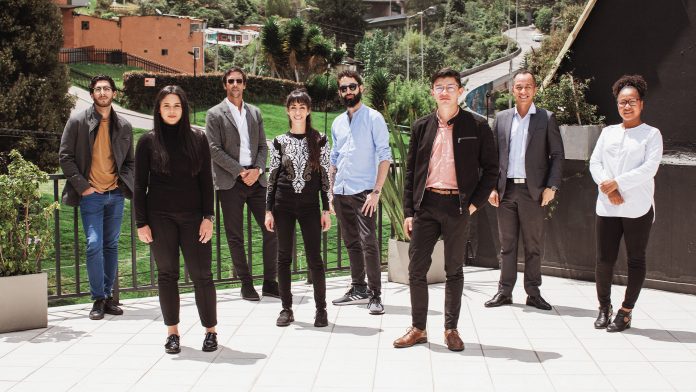
As many of you may have noticed through recent headlines & news articles, interest in the Colombian cannabis industry has exploded – here Green North Cannabis tells us more.
This early stage of the Colombian cannabis industry is when you can really position yourself strategically and choose your seat at the table. Later on, you will watch how others make the big cash outs and you will be left with secondary and marginal positions.
Investment in Colombian cannabis assets has gone through the roof and the companies within the sector are currently growing at an accelerated pace. Colombia, a country infamous due its long-standing civil war and illicit drug trade, is also a powerhouse for agronomic businesses. Coffee, bananas, palm oil and cut flowers are some of the agricultural commodities in which Colombia is a relevant player in the global market. Medicinal cannabis now seems to be the next big economic milestone for this developing country. We are going to tell you how this came to be and how you can be a part of this blooming economic opportunity.
On July 6 2016, the Colombian government made a historical leap into the future by writing the 1787 bill into law. The main purpose of this piece of legislation is to allow access to medicinal cannabis for patients who may benefit from the many therapeutic uses attributed to the plant. However, the legislators saw beyond just medical access for patients and created a legal framework which allows for the cultivation, extraction, final product manufacturing and export of cannabis-based products. By 2017 the 613 decree came into play, detailing the implementation of the law into practical terms.
Since then, individuals and corporations that want to operate medicinal cannabis businesses in the country have had to navigate all the rigorous legal and technical requirements before the Ministry of Health, National Narcotics Fund, Ministry of Justice, Ministry of Agriculture, INVIMA (Colombian equivalent of the North American FDA) and the Technical Quota Group. Those who have been able to successfully sort out this demanding and cumbersome process have found very profitable results on the other end of it.
Without a doubt, Colombia is already a household name when it comes to cannabis. Now within the world of the legal cannabis industry, Colombia has a Denomination of Origin of sorts and is being considered as a major production and export hub for cannabis products.
Even though the general investment climate is bullish on Colombia, the industry still presents a multitude of challenges, banking being on top of the list. Having cannabis being labelled as a schedule one substance under American Federal law, makes international wire transfers near impossible, since most SWIFT transactions go through an American correspondent bank, and American banking law is also federally regulated. On the other end, local banks in Colombia are wary of this new industry and the reputational hazards it may bring with it.
The reality is that entrepreneurs in the cannabis space lack the financial infrastructure and support many other industries enjoy. Little to no banking, lack of credit lines, and the increasing demand in terms of infrastructure and compliance have left a space for private capitalists to fill in the gap where banks and government have not been able to operate efficiently. But the truth is that most of the enthusiasts that are looking into the so called ‘green rush’ and the promise of the new Colombian commodity, enter blindly, fuelled by hope and speculation, expecting not to be left behind by the ‘money train’. The reason is simple, the industry is estimated to be worth USD $150B dollars(~€132.5 bn) according to the Green Fund, and could increase to $272 Billion by 2028 according to analysts at Barclays.
The green rush
Fear of missing out (FOMO) has been one of the great drivers in the influx of capital and attention into the Colombian industry. Promises of riches and legacy building wealth has created a driving force for a multitude of people of all walks of life to get into this nascent business opportunity and spearhead into a path full of legal grey areas and obstacles, ringing true to the classical risk-reward trade off.
The speculative climate surrounding Colombian cannabis has given an opportunity to misconstrue information and favour exciting headlines in detriment of reality. One example of this which we have seen in plenty of investor decks and presentations is the fact that ‘Colombia was awarded a 44% of the global quota for medicinal cannabis’, a phrase repeated over and over again by newcomers, media outlets and even by industry leaders. The reality is that at the end of the day, Colombia has only been able to successfully export a small quantity of dried flower to Canada for scientific research, and no commercial exports have occurred up to the date of this publication.
But the speculation and bullish sentiment is not entirely unfounded or based on misinformation, there are many reasons to believe Colombia will be a significant player in the industry. Cannabis derivative exports will likely begin by the last quarter of 2019. Many companies are setting up competitive grow-ops and some are even going to the extent of building out the GMP-EU extraction facilities and certifying other standards which are required for global trade.
Like any new industry, overnight experts, scam artists, aspirational legal advisors and entrepreneurs have flourished. This makes it difficult to cut through the hype and learn about the very real and profitable opportunity in the Colombian cannabis industry.
The Colombian cannabis opportunity
Often referred to as the ‘Why Colombia’ slide on many investor decks, we will proceed to describe a series of differentiating attributes which make Colombia an ideal location for the production of medical cannabis.
- Landraces and Denomination of Origin. As we have stated before, Colombia already had a major role in the illegal cannabis market and the country has a variety of stable landraces which have been proven to be effective and profitable in the past. Colombia is not new to cannabis.
- Geographical positioning and natural photoperiod. Located along the equatorial belt, Colombia is one of those privileged countries which has a natural 12-hour photoperiod all year round, which is just the right amount of light to have the cannabis plant flower into trichrome rich buds. In Colombia, depending on the variety and grow setup you can have up to 4 crop cycles a year without the need of artificial light (and its associated energy cost) except for the vegetative growth period. The country is also very well located in the middle of the American continent, with access to both the Atlantic and Pacific oceans, relatively close to the US and many other future export destinations.
- Level to snowy peaks and every other possible climate. It is located in between the world’s most imposing mountain range which leads down to the Amazon. The diversity of climates and regions make Colombia ideal for breeding and research activities.
- Labour cost and qualifications. As we had mentioned earlier, Colombia is the 2nd largest supplier of cut flowers, 3rd largest supplier of coffee and the 5th largest supplier of bananas. So, Colombia already has highly skilled labour force when it comes to agronomic businesses and wages are much lower than in Canada and the US.
- Legislation. The current legislation may have gaps and certainly much more to improve, but at the moment the legal framework makes it possible to exploit both psychoactive and non-psychoactive cannabis (Hemp), for national use (44 million population) and export. It allows the Import and export of products, precursors and seeds. It also contemplates the use of industrial hemp in the multitude of applications for the fibre, seed oils and so forth. Finally, it establishes a clear protocol to commercialise psychoactive components of the plant in accordance to the INCB. Having read and compared many other legislations, Colombia’s seems to be the one best suited for real unbridled growth.
How to take your piece of the pie?
Now you know how this exciting opportunity came to be, learned about some of the perspectives and speculation around it, as well as the competitive advantages Colombia brings to the industry. You must be thinking “How can I get a piece of this action?”
There are many ways to get involved into the cannabis space, we will discuss some of the most relevant ones.
The most straightforward approach is getting your licences. There are 4 types of licences you can apply for in Colombia, 3 of them are awarded by the Ministry of Justice and are related to cultivation.
- Psychoactive cultivation. It encompasses the cultivation of cannabis which contains >1% of THC;
- Non-psychoactive cultivation. This licence is aimed at those who want to grow what is normally referred to as Hemp. The threshold in the EU and US for cannabis to be considered hemp is below 0.2 and 03% THC respectively. In Colombia that threshold is below 1% THC;
- Seed for sowing. This licence is only useful if you exclusively intend to commercialise seeds and never sow, produce or cultivate.
The Ministry of Health awards a single licence, which is the derivative fabrication licence. This licence allows the licence holder to extract cannabinoids, oils, distillates, isolates and produce final products both for national use and export. This licence is very important since the export of biomass (dried flower) is prohibited by the Colombian government. You can only export cannabinoids once they have been transformed under a licence such as this.
The process of obtaining licences is costly both in money and time. Ideally the government should not take more than a couple of months to give you your licences but our first-hand experience tells us that licences can take from 6 months to a year to be awarded.
If you would like to take a shortcut down this path, the best option is to buy a licenced company. Even though the licences are not a transferable asset, the companies that possess the licences can be sold to others. Buying and selling licences is a tricky business; due diligence is a must and prices vary wildly. The average price for a licenced company with no other assets other than the licences themselves is around 1.5 to 3.5 million USD. However projected changes in the legislation will make obtaining licences from scratch more difficult, which will probably drive the price of these licenced companies up.
A third option is to invest in an ongoing project. Medicinal cannabis is a capital-intensive business. Even though it could potentially yield high profits, CAPEX and OPEX are demanding, which opens up room for investors to pick their favorite team and trade cash for equity. Finding the right partner in a country you don’t know can be very challenging. Competency, trust and knowhow are always the biggest issues to tackle.
If you already have a cannabis-based product and would like to distribute it in the Colombian market this is also a possibility. At the moment, the Colombian INVIMA (National Institute for Drug and Food Surveillance) allows the registry of Cosmetic products and topical anti-inflammatory ointments, but more uses will be credited in time. Sourcing final products from Colombia is also an option.
Cannabis, like any other industry requires a complete set of ancillary services and products to support its development. These range from corporate, financial, agricultural, compliance, security and many more, so basically whatever you are doing at the moment could potentially be repurposed and integrated into the medicinal cannabis value chain.
The time is now, it is important to move quickly in order to take advantage of this initial growth. This early stage of the industry is when you can really position yourself strategically and choose your seat at the table. Later, you will watch how others make the big cash outs and you will be left with secondary and marginal positions.
Surround yourself with the right people
We may have caught your interest at this point, and you might be considering making a move into the Latin American or Colombian cannabis space, but we must warn you, the ride is not for the faint of heart. Cannabis law is being built as we go, reforms on the decree, additional requirements for licensing, banking and financing remain key issues to resolve, and this is when good advisors are needed. Creativity, agility and track record should be in your top of mind when choosing who to work with in this space.
Good cannabis consulting goes way beyond just understanding legislation. Many law firms have decided to moonlight as cannabis consultants, and while they are well equipped to file paperwork, incorporate and tackle certain issues regarding compliance, their services will only take you so far.
They rarely give feedback on business models, they lack the vertical integration connections needed to properly develop the business, they lack understanding of the local and global cannabis markets, and they can’t be blamed for it; at the end of the day cannabis is another of their legal practices. Dedicated cannabis consultant firms are very hard to find, and that is what most people really need. Whether you are new to the industry or already a savvy cannabis business owner looking to set up shop in a new market you will benefit from a 360-degree approach to the issues.
You need a team that can file for licences, consider compliance, perform lobbying, advice on technology, agronomy, extraction, negotiation and that can connect you with the right people and probably help in the commercialisation of the commodity itself. We have always equated going into the cannabis business as jumping off a cliff and building a plane on the way down, it is an exciting and heart racing endeavor, one that requires the right partners and advisors.
Foundations, foundations, foundations
You are setting up a multimillion-dollar business, and that should be your mentality from day one. You wouldn’t build a skyscraper on weak foundations, would you? You want to do things right from the get-go. Get the best attorneys you can afford, care for legal incorporation, do tax planning, think about your exit strategies and end goals, invest as much as you can afford in the foundation of your cannabis business. You will need to invest a lot more down the line but having a good foundation will help you attract smart money (and lots of it), good partners and develop sensible business practices. By the time you are done building, you will have the certainty that you have something durable, stable and not just a house of cards. Build your business to last for generations, even if you want to sell it in a few years.
Invest in yourself, learn. Take online courses, talk to industry experts, go to international fairs, talk frequently with your advisors/consultants, ask questions, a lot of questions. Become acquainted with the terminology. Get passionate about the plant, it’s fascinating biology and potential. Trust me, it doesn’t take long to develop a real sense of excitement about cannabis, and this excitement will fuel you when dealing with the frustration of finding obstacles and unforeseen events. And yes, there will be many of those.
I would personally recommend:
- Steve Di Angelo – The cannabis manifesto (you can get it in audible if you lack the time to engage in reading);
- Green Flower Media online courses are worth every penny, and I have gone through most available online learning regarding cannabis;
- Javier Hasse’s book Start Your Own Cannabis Business is definitely worth your time; and
- Download New Cannabis Ventures to your phone and keep an eye on the financial side of the business. The numbers speak for themselves.
Finally, a bit of shameless self-promotion
We at Green North are specialised cannabis business consultants. This is what we do 24 hours a day 7 days a week. Based out of Bogotá, Colombia we tend to the Latin American territories and are opening offices in Peru and Panama within the next year.
Our firm has been specialised exclusively in Cannabis for a little over 3 years, as long as the Colombian legislation has been around, however our track record is impressive (if I may say so myself), we’ve consulted in over 28 awarded licences and we have 60 more on the way.
We have obtained for our clients every licence and modality available, we have performed ICA seed registrations, evaluation sowings, advised on final product registration and basically everything that can be legally done with cannabis in Colombia we have been a part of. Our dedication is absolute, and we are laser focused within the space. Our multidisciplinary team of employees and partners cover everything from legality, compliance, agronomy, transformation, registration, imports, exports, free trade zones, banking and more, much more.
If this article ignites your curiosity, give us a call. We love to talk all things cannabis and help people find the right space and opportunity within the industry, we are highly responsive and brutally honest. Just go to our website and write to sr@greennorth.co we are looking forward to turn this monologue into the business opportunity of a lifetime.
Santiago Restrepo
COO
Green North Cannabis
Business Consultants
+57 321 208 6458
sr@greennorth.co
https://www.greennorth.co/
Please note, this article will appear in issue 10 of Health Europa Quarterly, which will be available to read in July 2019.



















